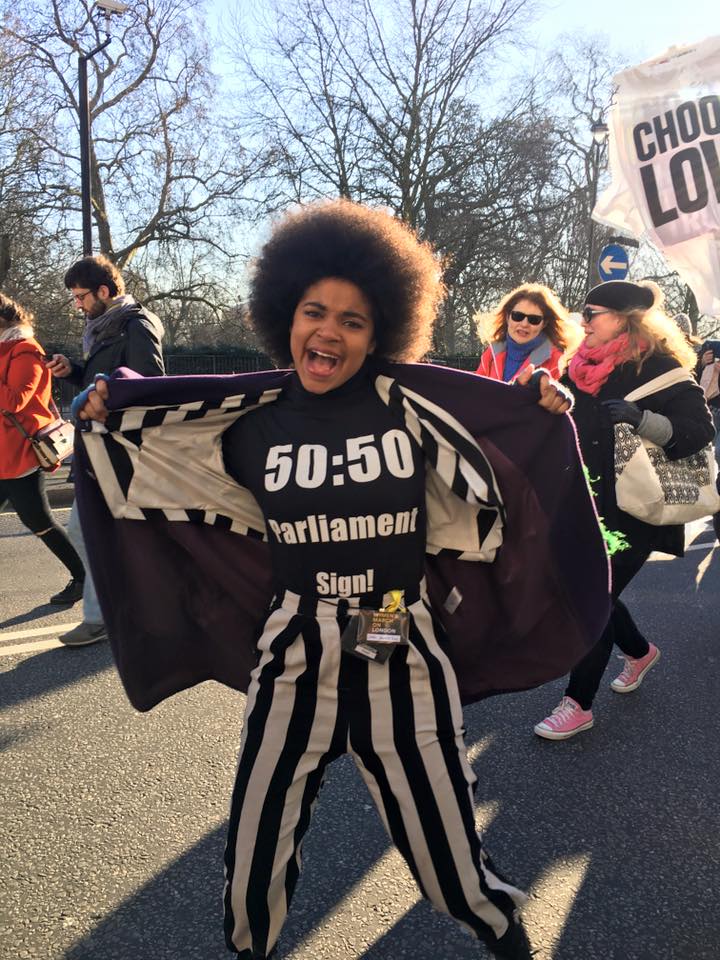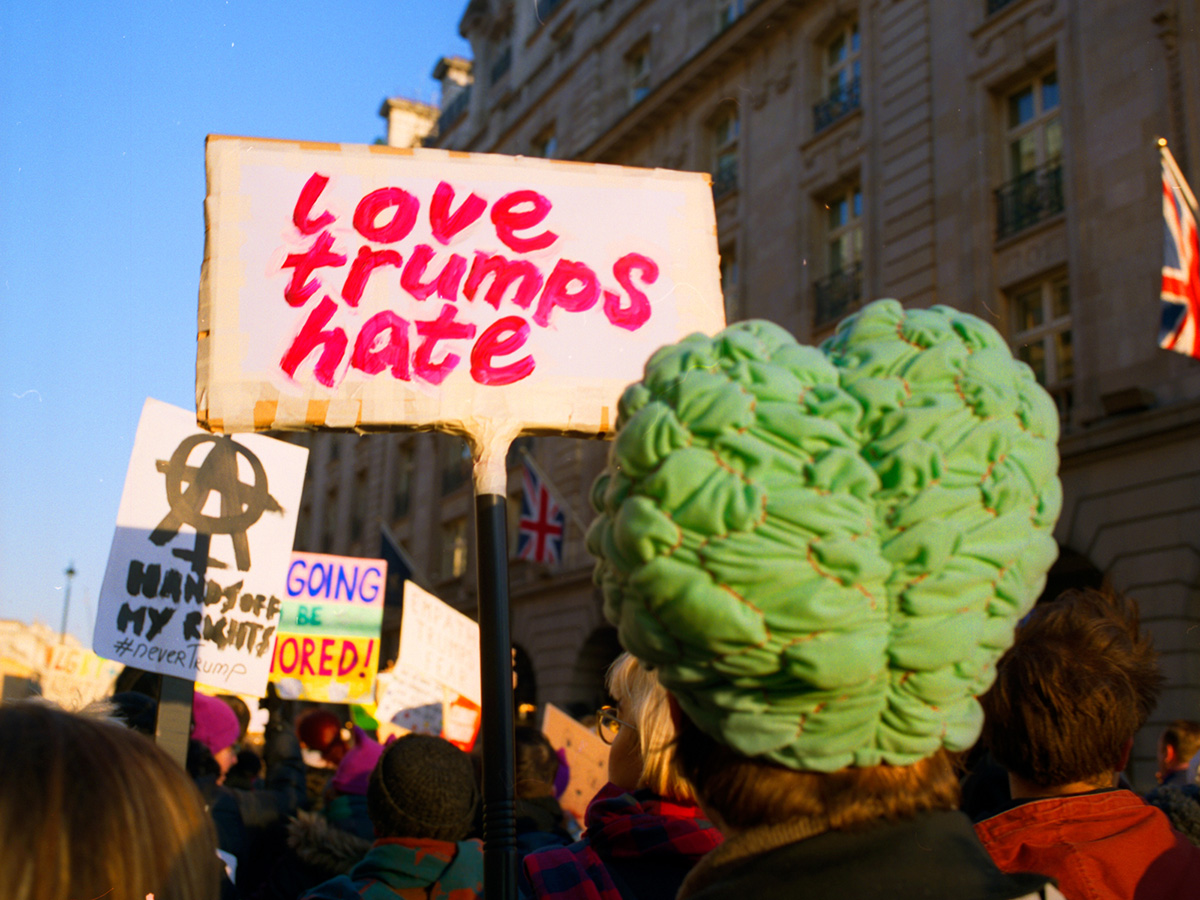Where were you when you found out Donald Trump won the US election? I was on my friend’s sofa, jittery with coffee, feeling like the earth had sunk beneath us. This wasn’t just Hillary Clinton losing to a man, this was a woman losing to a man who hates women: he’s called them fat pigs, dogs, slobs and disgusting animals (and when questioned on this, insisted the reporter was “bleeding out of her wherever”). Trump had already gone from words to deeds, too: expressing an anti-choice stance on abortion, stalking Clinton on stage during presidential debates, bragging on tape; “They let you do it. You can do anything. Grab ’em by the pussy” and was, at that point, accused by 11 women of sexual violations.
Though Trump collects bigotries like Imelda Marcos collected shoes, and various groups planned a backlash, over 200 women’s groups across America knitted together — not just pink pussy hats — and took to the streets. Made up of women, children and allies, the march on Washington took place the day after Trump’s poorly-attended inauguration to “assert the positive values that the politics of fear denies.”
Right-wing press insisted this protest was pointless. But under a year later, Trump’s distaste for Battersea, used as his excuse for cancelling his first presidential visit to the UK, only thinly veils his fear of being met by similar protests.
Though Foreign Secretary Boris Johnson tweeted that the UK’s relationship with Trump is “crucial” and has been “endangered” by Labour, shadow Foreign Secretary Emily Thornberry was heartened by the protest: “At a time when many of us felt profoundly depressed about a dangerous, sexist, racist like Trump assuming the Presidency, it was truly inspirational to see women across the world not sinking into despair, but showing we were prepared to stand up and fight.”
And the fight’s not over. “The overwhelming response and participation of masses of women in the Women’s March movement last year, and consistently through the year, is evidence that this movement is timely and has awakened an unwavering call for change,” says Dr Shola Mos-Shogbamimu, a spokesperson for Women’s March London, citing the mainstreaming of #MeToo as “a perfect example of women being emboldened to speak up.”
i-D spoke to some of the women who attended the march to find out what it meant to them, one year on.
Yasmin LaJoie, music industry worker
Normally, marches I go to are filled with left wing hippies, but a lot of people who’d never marched before felt the need to come and show solidarity this time. There were a lot more children, and the signs were about love and tolerance. I held one from Amnesty International reading “United Against Hate” because I wasn’t just marching against Trump, I was marching against a culture of misogyny. That so many people came out and supported the ideas that are dear to me validated me and my views, so I I had the confidence to go out into the world and make positive change. It didn’t feel like little old me fighting the good fight without anyone by my side. In late 2017, I went on the BBC to talk about assault and abuse in the music industry, saying: “This happened to me, it’s not ok. How can we change things?” It’s not just naming names, it’s about how to stop this happening in future. As for this year, I’ll definitely go along, if I can get my friends out of bed!
Lola Oriworo, copywriter
I’ve been hearing about gender inequality for ten years but this was the first time I’d heard of a protest about it. Though I knew my black friends weren’t that pressed about going, I was still surprised to see that it was overwhelmingly white. But as I walked along I was talking to people regardless of age or sexuality or representation and I felt like everyone was on the same page, it was reassuring. It was so quiet, though I did hear a girl do a feminist re-write of Spice Girls’ Wannabe.
The march put discussions about diversity — in both gender and race — on the table. And with #MeToo and #TimesUp, there are a lot of diverse voices around, but still so much work to make things intersectional. Last year was about awareness, now it’s about enacting change in ethical and productive ways. I’ll go to the march this year, it did feel really good last year.

Isabel Adomakah Young, actor, writer, activist
The day itself left me buzzing, I can’t ever remember being in a group of people united for something — apart from at a Beyoncé concert — knowing that we shared a vision. There were criticisms of it being a middle class white women’s event but it was amazing to see middle aged men there, it got me excited that we’re really about to see the change.
I spoke in Trafalgar Square on behalf of 50:50 Parliament, which looks at gender representation in politics. With marches of global solidarity, it’s important to support women who have even fewer rights than we do, but at the same time remember our system is broken too. I was lucky to paint a picture of that and remind people there are 50 other countries that have better gender representation than we do – there are things the UK is actively failing at. The march was about visible resistance, showing we care enough to take to the streets and put our energy into change, and it was about solidarity. The march didn’t change the nature of my activism, but there was something about knowing that it’s not just you, it’s not a pocket of people who get together dreaming of changing the world. There’s a lot of people who believe in this. I absolutely will go along this year if I can, it’s great to show that this is ongoing.
Jade, a member of Women for Refugee Women’s grassroots network
The march has stayed with me. To be together with all those women, it made me feel great! At the Women’s March we had power. All those people were listening and they were repeating: “Set Her Free!” The poem we wrote and performed is all about freedom. We want to be free. In our drama classes we are free and when we march we are free. There were just so many people supporting us. They were friendly, which encouraged me and made me feel happy and strong. I felt that refugee women are not alone and that people care. So many women have been through difficult experiences and it is important to come together. It gives us power to march together.
